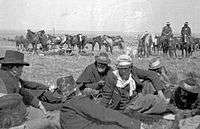Isabelino Canaveris
| Isabelino Canaveris Farias | |
|---|---|
 Lt. Colonel. Isabelino Canaveris | |
| Personal details | |
| Born |
July 8, 1852 Montevideo, Uruguay |
| Died |
c.1910 Buenos Aires, Argentina |
| Nationality | Uruguayan |
| Political party |
|
| Spouse(s) | Enriqueta Trillo |
| Occupation | Politician |
| Profession | Military man |
| Military service | |
| Allegiance |
|
| Service/branch | Uruguayan Army |
| Years of service | 1865-1904 |
| Rank | Lieutenant Colonel |
| Battles/wars |
Rebelión Jordanista Batalla de Paso Severino Batalla de Sauce Batalla de Corralito Batalla de Manantiales Batalla de los tres Árboles |
Isabelino Canaveris (1852-c.1910) was an Uruguayan patriot, military, revolutionary and politician. He had an active participation during the Uruguayan Civil War between Blancos and Colorados.[1]
Military career

Canaveris was born on July 8, 1852, in Montevideo, son of Sinforoso Camilo Canaveris, born in Buenos Aires, and Rosa Farias Zubillaga, belonging to a traditional Uruguayan family. He began his career in 1865 as a volunteer soldier, in the battalion of Extramuros, commanded by Linares. Three years later, he was promoted to Sub-Lieutenant, taking active participation in the revolution of Bernardo Berro, occurred on February 19, 1868. In 1870 Canaveris participated in The Jordanist Rebellion, serving as Second lieutenant, in the battalion commanded by Anacleto Medina. That same year he took part in the Revolution of the Lances, led by Timoteo Aparicio.[2]
In August 1871, Canaveris was promoted to the rank of Captain, later promoted as Sergeant Major in 1875, and March 20, 1886, he reached the rank of Lieutenant Colonel, during the Revolución del Quebracho.[3]
During his long military career, Canaveris participated in many armed conflicts that occurred during the Guerra Grande, including Revolución tricolor, Batalla de Paso Severino, Batalla de Corralito, Batalla de Sauce, Batalla de Manantiales and Batalla de los tres Árboles, conflict where served as escort of Colonel Diego Lamas.
Isabelino Canaveris did not take part in the last Uruguayan civil conflict (Revolución de 1904), due to disagreements with the leader of the Blanco party José María Pampillón.[4] He had established about thirteen political clubs in the city of Buenos Aires, with more than 5,000 affiliate partners.[5] He withdraws of the army, about the year 1905.[6]
Ancestors and family
His father Sinforoso Canaveris had served in the Army as a lieutenant in the Batallón de Voluntarios Rebajados of Buenos Aires,[7] a military force formed with former members of the army. He possibly participated in the Campañas de Rosas al Desierto of 1830s.[8] Isabelino was the grandson of Manuel Jugluns de Canaveris, a lieutenant of urban militias, who served in the Regiment of Patricians, and María de los Ángeles Rodríguez Calderón de la Barca, a criolla, daughter of a family from the neighborhood of Monserrat. His paternal surname in all its variants is found in parish registers of France and Italy, including the historical regions of the Marquisate of Saluzzo and Duchy of Aquitaine.[9]
Nothing is known about the surname "Jugluns", belonging to his great grandfather, Juan Jugluns de Canaveris, possibly had its origin in some unknown place in Western Europe. Through his mother Isabelino Canaveris descended from ancient Creole families of Portuguese and Asturian origin.[10]
Isabelino Canaveris was married to Enriqueta Trillo, born in Entre Ríos,[11] daughter of Dionisio Trillo and Carmen Aguiar, belonging to important Uruguayan families. He and his wife were the parents of María Esther, Isabelino Manuel, Julio, Enriqueta, Alfredo and Bernardo Sixto Canaveris. After having settled in the city of Buenos Aires, Canaveris and his family lived for several years in a house located on Chile Street at 769 San Telmo neighborhood.[12]
His son, Julio D. Canaveris did his elementary studies in the Colegio del Salvador,[13] and obtained a doctorate in the Faculty of Medicine of the University of Buenos Aires in 1907.[14] He was married to Blanca Panelo Bosch. His daughter, Blanca Canaveris Panelo was the wife of Saturnino Soriano Nazar, a descendant of Richard Blake Newton.[15]
Isabelino Canaveris was nephew of María Farías Zubillaga, the wife of José Brito del Pino, one of the founders of the White Party.
References
- ↑ Luis Mongrell, 1858-1937: político, revolucionario y periodista, cabañero y ruralista : historia de un luchador, Hugo Mongrell
- ↑ La Revolución Oriental de 1870, Abdon Arozteguy
- ↑ General Aparicio Saravia, República Oriental del Uruguay, Comisión Honoraria pro Museo Histórico en El Cordobés, 1978
- ↑ Orientales en Argentina, Revista el Uruguay
- ↑ Grandeza y decadencia del Partido Nacional, José Calatayud Bosch
- ↑ La caída de un régimen ...., Volume 1, Haedo, Eduardo Víctor.
- ↑ Indice del Archivo del Departamento general de Policía, Buenos Aires - Departamento de Policía
- ↑ Revista del Instituto Nacional de Investigaciones Históricas Juan Manuel de Rosas, Issues 54-57, Instituto Nacional de Investigaciones Históricas Juan Manuel de Rosas
- ↑ Index of Ancient Petitions of the Chancery and the Exchequer, Preserved in the Public Record Office, Stationery office
- ↑ Historia de los pueblos orientales:, Academia Nacional de Letras
- ↑ Jurisprudencia criminal y comercial:, Buenos Aires (Argentina). Cámara de Apelación de la Capital
- ↑ Jurisprudencia criminal y comercial:, Buenos Aires (Argentina). Cámara de Apelación de la Capital
- ↑ Historia del Colegio del Salvador:, Fúrlong Cárdiff, Guillermo, 1889-
- ↑ Revista de la Universidad, Universidad de Buenos Aires
- ↑ Genealogía, Issue 20, Instituto Argentino de Ciencias Genealógicas